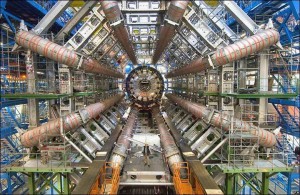MONDAY, 3 OCTOBER 2011
The large hadron collider (LHC) has a less than straightforward history. The idea for the Geneva-based experiment emerged in the 1980s, but it wasn’t until 1996 that approval for the £1.3 billion project was granted. It took 13 years to complete during which time it went grossly over budget, having to borrow hundreds of millions of euros. Furthermore, when it was first brought online it lasted just nine months before a malfunction forced it to shut down for nearly a year. However, the LHC is finally up and running again, and providing some amazing insights into the birth of the Universe itself. But in a time of such economic hardship, many are wondering whether it is really worth the investment of so much time and money.The collider is a collaborative initiative based at the European Organisation for Nuclear Research (commonly referred to as CERN, from the French acronym). It consists of a synchrotron particle accelerator housed in a 27 kilometre long underground tunnel. It uses strong magnetic fields to accelerate two beams of protons (hadrons) in opposite directions, which, once up to speed, are collided. On impact, these particles release the huge amounts of energy gained during acceleration creating new, more massive particles. Colliding the beams in opposite directions gives the maximum energy for particle creation, allowing mankind to create its heaviest particles.
However, there is scepticism in some circles about how the LHC will benefit science. The purpose of the LHC is to recreate the conditions and energies present immediately after the big bang, with the hope of discovering how our Universe came into existence. The latest theories in particle physics on why the Universe around us behaves the way it does, will be put to the test. The idea of ‘recreating the big bang’ initially worried a portion of society who held the misconception that the LHC may create black holes which could swallow the Earth—an idea fuelled by uninformed scaremongering in some popular tabloid newspapers. Fortunately, this was never a possibility. The LHC is looking to simulate the energies present after the big bang, not recreate it. Still, these reports went some way to damaging the reputation of the experiment and with an ever increasing list of public spending cuts, calls for the UK to give up its part in the work at Geneva are at their loudest.
So how much does the LHC actually cost the UK? The total project cost is £2.6 billion split between the 20 member states of CERN. The UK’s contribution to the LHC is approximately £95 million per year, which equates to just over a pound per head of our population. With the total UK budget for 2012 being £702 billion, the UK’s contribution to CERN equates to less than 0.00015% of this. Other leading scientific forces in Europe are also heavily invested in the LHC project, no doubt because they realise the huge potential and importance of the experiment. To keep its place among those at the pinnacle of scientific research, the UK has to remain involved.
The importance of the project can only be understood when we look at the magnitude of the work being undertaken. The most high profile work being carried out at CERN, in collaboration with colleagues at the Tevatron, a similar particle accelerator based near Chicago, is the search for the Higgs boson. This fundamental subatomic particle, named after British physicist Peter Higgs, is predicted by the current standard model for particle physics. If it is proved to exist, it provides evidence for a mechanism by which particles can acquire mass, an idea that is vital in modern theories. In addition, the LHC is looking for dark matter particles. Dark matter only interacts via gravitational effects and does not emit or scatter electromagnetic radiation, such as visible light, the way normal matter does. Its existence is hypothesised to explain discrepancies between the calculated and observed masses of distant galaxies and why stars of these galaxies are orbiting ‘too quickly’ for the observed mass. Dark matter is thought to compose around 25% of the Universe, with normal matter contributing about 5% and the rest being composed of dark energy. If the LHC can help to identify a working theory for dark matter then it will lead to a new and novel understanding of how the Universe behaves. The LHC also hopes to shed some light on the idea of supersymmetry, which states that for every particle there is an opposite superpartner, and on string theory, which postulates that there are 11 dimensions rather than just the 4 we observe (height, width, depth, time). As with any science experiment, the answers will not be instantaneous, but the results that have already come out more than validate the project’s existence.
For example, scientists at CERN have already successfully trapped antimatter and more importantly kept it stable long enough to study it: a breakthrough which could help us understand the origin of the Universe. Antimatter is the opposite of matter. At the beginning of the Universe matter and antimatter should have been created in equal amounts yet we observe far greater amounts of matter. It is currently postulated that collisions between matter and antimatter in the early Universe caused the destruction of large amounts of antimatter. Studying the artificially created antimatter at CERN could help explain the early life of the Universe.
All of us yearn for understanding and it is natural for us to want to comprehend the world on which we live and the Universe in which our planet resides. The LHC is a massive leap forward in discovering how the Universe was born and how it continues to evolve and behave. Breakthroughs at CERN are already leading to a greater understanding of how the Universe came into being.
The questions that we have all asked are not going away, and neither is our fascination with their potential answers. What happened at the beginning of the Universe? Why is the Universe the way it is? What is the Universe made of? The LHC is trying, and slowly beginning, to answer these queries—I believe the price is a small one to pay to continue this endeavour.
Richard Thomson is a PhD student in the Department of Earth Sciences


